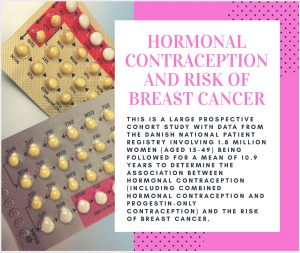Hormonal Contraception and Risk of Breast Cancer
TAKE-HOME MESSAGE
* This study assessed 1.8 million women who were followed on average for 10.9 years for associations between the use of hormonal contraception and the risk of invasive breast cancer in a nationwide prospective cohort study involving all women in Denmark between 15 and 49 years of age. A total of 11,517 cases of breast cancer occurred. Compared with women who had never used hormonal contraception, the relative risk of breast cancer among all current and recent users was 1.20. This risk increased from 1.09 (not significant) with less than 1 year of use to 1.38 (significant) with more than 10 years of use (P = .002). After discontinuation, the risk of breast cancer was still higher among the women who had used hormonal contraceptives for 5 years or more than among women who had not used them. Risk estimates associated with current or recent use of various oral combination (estrogen–progestin) contraceptives varied between 1.0 and 1.6. Women who currently or recently used the progestin-only intrauterine system also had a higher risk of breast cancer than women who had never used hormonal contraceptives (RR, 1.21).
* The overall absolute increase in breast cancers diagnosed among current and recent users of any hormonal contraceptive was 13 per 100,000 person-years, or approximately 1 extra breast cancer for every 7690 women using hormonal contraception for 1 year.
– Jeffrey Wiisanen, MD
This is a large prospective cohort study with data from the Danish National Patient Registry involving 1.8 million women (aged 15–49) being followed for a mean of 10.9 years to determine the association between hormonal contraception (including combined hormonal contraception and progestin-only contraception) and the risk of breast cancer. The study identified an increase in the relative risk of breast cancer to 1.20 among current or recent users of hormonal contraception and increasing to a 1.38 relative risk with more than 10 years of use.
A fear of cancer has long been a reason people cite for not using hormonal contraception. However, the absolute risk in this study shows only an increase of 13 cases per 100,000 person-years, or approximately 1 extra breast cancer diagnosis for every 7690 users. Although there is a clear statistical significance, the clinical significance may be low, particularly in context of the decrease of both ovarian and endometrial cancer in hormonal contraception users, which has been well-documented.
One criticism of the study is that it does not address cancer mortality or overall mortality after breast cancer diagnosis. Some have also speculated that this increase of breast cancer may be partly contributed to by the increased number of visits to healthcare providers paid by users of hormonal contraception likely associated with cancer screening and therefore diagnosis, in comparison with non-users of contraception paying fewer visits to healthcare providers, although the authors argue that this would not fully explain the association.
As with other risks of hormonal contraception, such as venous thromboembolism, breast cancer risk should be weighed against both the contraceptive and non-contraceptive benefits, and clinicians should appropriately screen for and identify risk factors, and work with patients to minimize risks where possible.
At Botanica Medica our Naturopaths come across lots of interesting studies and are always updating their knowledge. If you would like to make an appointment with one of our Naturopaths call Botanica Medica on 8271-1827 today. They are only to happy to share the knowledge they have gained through their studies and patient outcomes, and get you feeling better. Botanica Medica is located at 97 Glen Osmond Road, Eastwood and appointments are available Monday to Saturday including some after hours.
Published in Primary Care and
1 other channel
Journal Scan / Research · December 27, 2017
The New England Journal of Medicine
Primary Care Written by Anna Sliwowska MD


Recent Comments